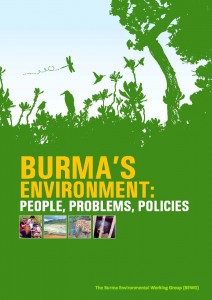Burma’s Environment: People, Problems, Policies
By Burma Environmental Working Group • July 25, 2011 Burma is currently facing many threats to the natural environment and sustainable livelihoods, such as construction of large dams, oil and gas extraction, mining, deforestation, large-scale agricultural concessions, illegal wildlife trade and climate change. The majority of Burma’s income comes from selling off natural resources, including billions of dollars from gas and hydropower development. Investment comes from countries within the region– most significantly China, India and Thailand. Malaysia, Singapore, Japan, Vietnam and Korea are also key investors looking to increase investments after the elections. These resource extractive investments damage the environment and threaten local resource-based livelihoods, particularly in ethnic areas.
Burma is currently facing many threats to the natural environment and sustainable livelihoods, such as construction of large dams, oil and gas extraction, mining, deforestation, large-scale agricultural concessions, illegal wildlife trade and climate change. The majority of Burma’s income comes from selling off natural resources, including billions of dollars from gas and hydropower development. Investment comes from countries within the region– most significantly China, India and Thailand. Malaysia, Singapore, Japan, Vietnam and Korea are also key investors looking to increase investments after the elections. These resource extractive investments damage the environment and threaten local resource-based livelihoods, particularly in ethnic areas.
A new report highlights how Burma lacks any meaningful frameworks on environmental protection and sustainable development that would enable citizens to take part in decision-making about their country’s development, despite a recent transition to a military-dominated parliamentary political system. Land tenure remains weak and there are no safeguards in place to protect farmers.
The 100-page publication, entitled Burma’s Environment: People, Problems, Policies, demonstrates serious risks facing Burma’s extensive biodiversity and abundant natural resources, and it challenges the direction the country is taking toward increased large-scale resource extraction projects in the oil, gas, hydropower and mining sectors. Burma is a state party to several international treaties relating to the environment, but according to the report it is unclear whether the contents of those treaties have been ratified in practice and incorporated into domestic law.
Download the report in English here.
Tags: Armed Conflict, Burma Environmental Working Group, Dams, Deforestation, Environment, MiningThis post is in: Business and Human Rights, Environmental and Economic Justice, Spotlight
Related PostsBurma Army Displays Blatant Disregard for 21st Century Panglong Peace Process
On Union Day, Reappraisal of the Peace Process is Needed
ရွမ္းျပည္တိုိးတက္ေရးပါတီ၊ ရွမ္းျပည္တပ္မေတာ္ SSPP/SSA ထုတ္ျပန္ေၾကညာခ်က္
Time for the Government to Accept the Reality of Human Rights Problems, Take Effective Measures and Move Forward
Kachin Region: War Torn Displaced Village Profiles









 All posts
All posts